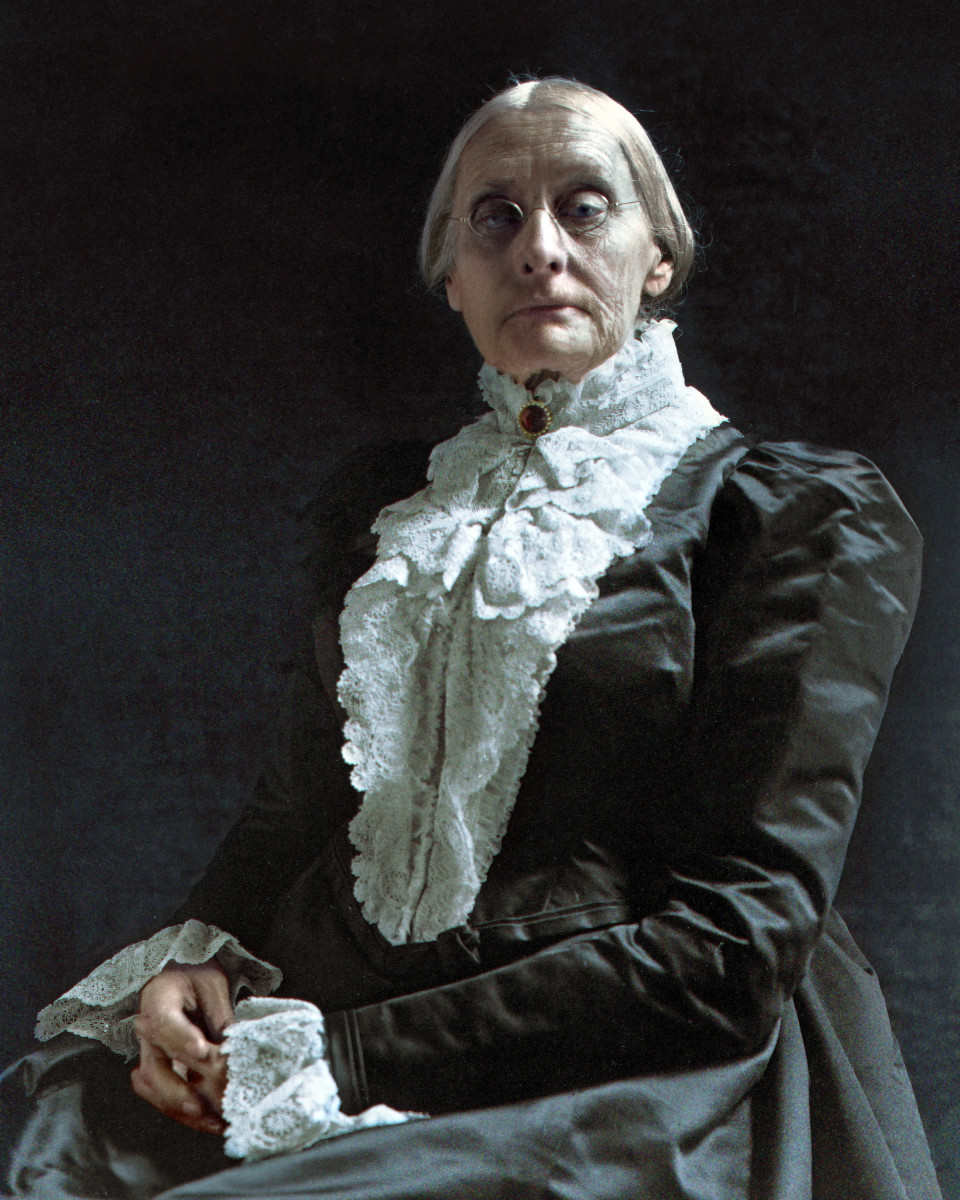Childhood
Susan B Anthony was born on February 15, 1820, in Massachusetts. She was one of eight kids raised in a Quaker household and due to her Quaker upbringing, she had an immense belief that everyone was equal under God and that God exists within every human being. Due to her and her family’s beliefs, Susan B Anthony played a role in activism at a very young age. At the age of 17 she was already participating in abolitionist meetings in her own home. As Anthony got older, she later became a teacher at a school in Rochester, N.Y earning less pay than her male counterparts. Much of Susan B Anthony’s childhood and early adult years built the foundation for her work in later years.
Women's Rights
Susan B Anthony is most known for her work in Women’s rights by being recognized for being president, of the Rochester branch of the daughters of Temperance, organizing the Women’s National Loyal League, the first national women’s political organization in the United States, and giving speeches alongside Elizabeth Cady Stanton. During this time there were many ways that women were treated wrongly. However, the biggest right Susan B Anthony is most known for fighting for is women's right to vote. In 1872 Susan B Anthony was arrested for casting an illegal ballet, which inspired this famous line from her speech On Women's Right to Vote "It was we, the people; not we, the white male citizens; nor yet we, the male citizens; but we, the whole people, who formed the Union.” Anthony believed that if women didn’t have the right to vote they would never be able to move up in the world and they would continue to be second to men.
Abolitionist
However, while Susan B
Anthony is most known for her work in women's suffrage, she also was an
abolitionist that fought for slavery to end. From an early age, Anthony was a
participant in the abolition movement in her own home this is where she met men
such as Fredrick Douglas who not only taught her about what it is like to be a
slave in America but also gave speeches alongside her. Anthony served as an
agent for the American Anti-Slavery Society and gave speeches such as Make theSlave’s Case Our Own, In this speech she asks her audience to put themselves
in the slave’s position, asking them to imagine if they were the people put
through one of the vilest forms of slavery ever seen.
I would like to think that
Susan B Anthony would include all these life experiences and elements in her
speech. Below I’ve highlighted all the elements made above in what I envisioned
Susan B Anthony would say with blue being her childhood and beliefs, pink being
her work with women’s rights, and purple being her views on abolishing
slavery.
Town Hall Speech
Good
afternoon, Everyone
My
name is Susan B Anthony, however many of may know me as the infuriating woman that wants to ban alcohol, others
of you may refer to me as the woman that needs to sit down and shut up, and some of you may
know me as a friend or teacher. However,
regardless of my reputation, I am here to ask you to question your beliefs and
ask yourselves how it can be possible to enslave a human.
First
and foremost, what makes a human a human?
Under God, a human is
self-conscious, willful, and created with a purpose
According to some of you, a human is someone with the ability to vote to make
women and slaves second class
However, I believe being a
human is being able to understand that there is God within each and every one
of us giving us the ability to empathize when we are treated unfairly.
Therefore,
I would like to simply ask you to use your god given ability to empathize
Imagine working day after day
in the rain, sleet, or snow and never reaping the benefits of your tireless
endless work
Imagine the only difference
between yourself and a pig is how much you’ll run for on the market
Imagine never knowing what it
means to be considered your own person, but instead being forced to carry out
the will of a man with the same capabilities as you.
The
majority of you will hear this and see it as nothing more than meaningless
because anything coming out of a woman's mouth does not matter and never will, but more importantly, many of you believe you cannot empathize with
slaves because they are not a person, they are 3/5 of a person, you cannot empathize
with something that is not a man.
You
cannot empathize with something that cannot read and write
You
cannot empathize with something that cannot make a choice
You
cannot empathize with something that cannot think
However even as a so-called
fragile, incompetent, delusional woman, I have been able to meet people that
completely defy your beliefs. I have met men such as Fredrick Douglass who has the ability to
not only read and write but also communicate their ideas eloquently and
critically. Yet based on many of your
beliefs this is impossible simply due to the color of their skin or the curl of
their hair.
Instead of challenging your
beliefs or questioning how you could possibly align your Christian beliefs to
justify your right to treat a human created by God as less than an animal, you
pat yourselves on the back for civilizing these barbaric people. You taught them Christianity a religion that states do to
others as you would do to them yet subject slaves to the will of their master.
In
closing I would like to leave you with this statement If, by some magic power,
the color of our skin could be instantly changed and the slave’s fate made
really our own, then there would be no farther need of argument or persuasion,
or rhetoric or eloquence.
Additional Links
https://www.womenshistory.org/education-resources/biographies/susan-b-anthony
https://ipg.vt.edu/DirectorsCorner/re--reflections-and-explorations/Reflections102218.html








No comments:
Post a Comment